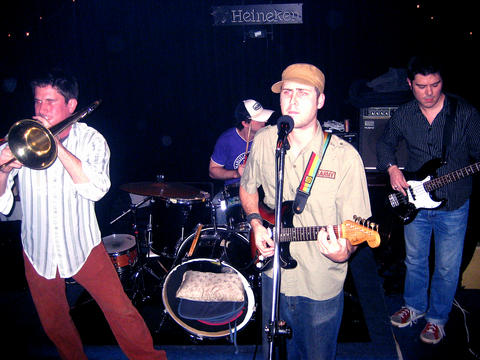The weekend was notable both for live bands and clubbing, with entertainment that covered a wide spectrum of sounds, visions and spectacle.
Starting early on Thursday night, a new band called High Tide completely rocked the crowd at Bliss, which was to be expected, given its lineup: Jesse Morden from Johnny Fatstacks on guitar, Moshe Foster from Public Radio on guitar and vocals, Greg Russell from Consider the Meek on drums, and Andy Francis from The Money Shot Horns on trombone.
Bass player Michael Tennant provided a slippery, whacked-out backbone for the group's primarily reggae sound.

PHOTO: ALITA RICKARDS
Foster's sweet voice and lyrics charmed the audience. Francis took trombone playing to a new level with rock star moves - he jumped in the air and executed a flying kick while playing, which sent some of the ladies in the crowd into a frenzy.
The group was followed by Johnny Fatstacks, which started out a bit on the slow side with cover songs. Once the group moved onto its original music, the outfit's real style shone through. Johnny Fatstacks is a rock group that crosses the line into rockabilly and alternative country, which sets it apart from the more generic sounds of local run-of-the-mill bands and makes dancing mandatory.
The Money Shot Horns played Bliss on Friday and pleased the crowd with crooning blues lyrics and funky, sexy music.
On Saturday night, superstar DJ SL played a kicking set at Barcode. It was a definite departure from the norm, and introduced a new sound to Taipei: dance-house-electro-rock.
The night continued at underground club AgeHa, with DJs F Dragon, Kid Killy, Funkstar, and others playing new-wave rave mixed with down-tempo drum and bass enthused with electro thrash. There was a massive turn out of Taipei kids, who got into the Neon Ball theme with gusto: bizarre hair cuts and fluorescent colors, Day-Glo clothing, and anime-style outfits. One boy had a fluorescent green stocking on his head. A sexy transvestite rounded out the crowd dressed as a kinky flight attendant. Props go to her for showing this reporter where the emergency exit was.
"I was a model. I had to carry a boom box," said Taipei resident Jenna Pearce. "A bunch of those Ximenting kids went. They were pretty rad. They hang out at that Vicious Circle club. The electro thrash was top notch; I was really excited to hear Yell. It was good to dance to. There was something in the air. The neon theme was mostly about the clothes, which were really different with super busy prints, and that's really fresh right now and the trend for this summer. The night was meant to be a promo for Pet Shops Girl, a shop in Ximending."
To check out the freshest clubbing style in town, visit www.wretch.cc/blog/petshopsgirl.

April 28 to May 4 During the Japanese colonial era, a city’s “first” high school typically served Japanese students, while Taiwanese attended the “second” high school. Only in Taichung was this reversed. That’s because when Taichung First High School opened its doors on May 1, 1915 to serve Taiwanese students who were previously barred from secondary education, it was the only high school in town. Former principal Hideo Azukisawa threatened to quit when the government in 1922 attempted to transfer the “first” designation to a new local high school for Japanese students, leading to this unusual situation. Prior to the Taichung First

The Ministry of Education last month proposed a nationwide ban on mobile devices in schools, aiming to curb concerns over student phone addiction. Under the revised regulation, which will take effect in August, teachers and schools will be required to collect mobile devices — including phones, laptops and wearables devices — for safekeeping during school hours, unless they are being used for educational purposes. For Chang Fong-ching (張鳳琴), the ban will have a positive impact. “It’s a good move,” says the professor in the department of

On April 17, Chinese Nationalist Party (KMT) Chairman Eric Chu (朱立倫) launched a bold campaign to revive and revitalize the KMT base by calling for an impromptu rally at the Taipei prosecutor’s offices to protest recent arrests of KMT recall campaigners over allegations of forgery and fraud involving signatures of dead voters. The protest had no time to apply for permits and was illegal, but that played into the sense of opposition grievance at alleged weaponization of the judiciary by the Democratic Progressive Party (DPP) to “annihilate” the opposition parties. Blamed for faltering recall campaigns and faced with a KMT chair

Article 2 of the Additional Articles of the Constitution of the Republic of China (中華民國憲法增修條文) stipulates that upon a vote of no confidence in the premier, the president can dissolve the legislature within 10 days. If the legislature is dissolved, a new legislative election must be held within 60 days, and the legislators’ terms will then be reckoned from that election. Two weeks ago Taipei Mayor Chiang Wan-an (蔣萬安) of the Chinese Nationalist Party (KMT) proposed that the legislature hold a vote of no confidence in the premier and dare the president to dissolve the legislature. The legislature is currently controlled